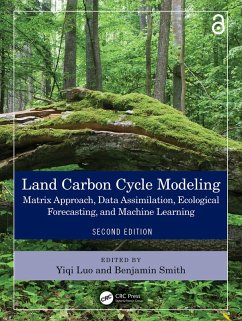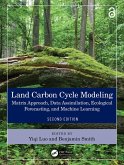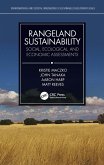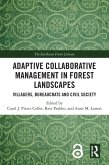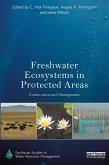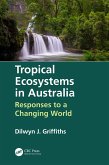Land Carbon Cycle Modeling (eBook, PDF)
Matrix Approach, Data Assimilation, Ecological Forecasting, and Machine Learning
Redaktion: Luo, Yiqi; Smith, Benjamin
157,95 €
157,95 €
inkl. MwSt.
Sofort per Download lieferbar

79 °P sammeln
157,95 €
Als Download kaufen

157,95 €
inkl. MwSt.
Sofort per Download lieferbar

79 °P sammeln
Jetzt verschenken
Alle Infos zum eBook verschenken
157,95 €
inkl. MwSt.
Sofort per Download lieferbar
Alle Infos zum eBook verschenken

79 °P sammeln
Land Carbon Cycle Modeling (eBook, PDF)
Matrix Approach, Data Assimilation, Ecological Forecasting, and Machine Learning
Redaktion: Luo, Yiqi; Smith, Benjamin
- Format: PDF
- Merkliste
- Auf die Merkliste
- Bewerten Bewerten
- Teilen
- Produkt teilen
- Produkterinnerung
- Produkterinnerung

Bitte loggen Sie sich zunächst in Ihr Kundenkonto ein oder registrieren Sie sich bei
bücher.de, um das eBook-Abo tolino select nutzen zu können.
Hier können Sie sich einloggen
Hier können Sie sich einloggen
Sie sind bereits eingeloggt. Klicken Sie auf 2. tolino select Abo, um fortzufahren.

Bitte loggen Sie sich zunächst in Ihr Kundenkonto ein oder registrieren Sie sich bei bücher.de, um das eBook-Abo tolino select nutzen zu können.
This new edition includes 7 new chapters on machine learning and its applications to carbon cycle research, on principles underlying carbon dioxide removal from the atmosphere, a contemporary active research and management issue, and on community infrastructure for ecological forecasting.
- Geräte: PC
- ohne Kopierschutz
- eBook Hilfe
- Größe: 89.98MB
Andere Kunden interessierten sich auch für
![Land Carbon Cycle Modeling (eBook, ePUB) Land Carbon Cycle Modeling (eBook, ePUB)]() Land Carbon Cycle Modeling (eBook, ePUB)155,95 €
Land Carbon Cycle Modeling (eBook, ePUB)155,95 €![Valuing Nature (eBook, PDF) Valuing Nature (eBook, PDF)]() Robert FishValuing Nature (eBook, PDF)0,00 €
Robert FishValuing Nature (eBook, PDF)0,00 €![Rangeland Sustainability (eBook, PDF) Rangeland Sustainability (eBook, PDF)]() Kristie MaczkoRangeland Sustainability (eBook, PDF)47,95 €
Kristie MaczkoRangeland Sustainability (eBook, PDF)47,95 €![Creating Resilient Landscapes in an Era of Climate Change (eBook, PDF) Creating Resilient Landscapes in an Era of Climate Change (eBook, PDF)]() Creating Resilient Landscapes in an Era of Climate Change (eBook, PDF)0,00 €
Creating Resilient Landscapes in an Era of Climate Change (eBook, PDF)0,00 €![Adaptive Collaborative Management in Forest Landscapes (eBook, PDF) Adaptive Collaborative Management in Forest Landscapes (eBook, PDF)]() Adaptive Collaborative Management in Forest Landscapes (eBook, PDF)0,00 €
Adaptive Collaborative Management in Forest Landscapes (eBook, PDF)0,00 €![Freshwater Ecosystems in Protected Areas (eBook, PDF) Freshwater Ecosystems in Protected Areas (eBook, PDF)]() Freshwater Ecosystems in Protected Areas (eBook, PDF)53,95 €
Freshwater Ecosystems in Protected Areas (eBook, PDF)53,95 €![Tropical Ecosystems in Australia (eBook, PDF) Tropical Ecosystems in Australia (eBook, PDF)]() Dilwyn GriffithsTropical Ecosystems in Australia (eBook, PDF)59,95 €
Dilwyn GriffithsTropical Ecosystems in Australia (eBook, PDF)59,95 €-
-
-
This new edition includes 7 new chapters on machine learning and its applications to carbon cycle research, on principles underlying carbon dioxide removal from the atmosphere, a contemporary active research and management issue, and on community infrastructure for ecological forecasting.
Dieser Download kann aus rechtlichen Gründen nur mit Rechnungsadresse in A, B, BG, CY, CZ, D, DK, EW, E, FIN, F, GR, HR, H, IRL, I, LT, L, LR, M, NL, PL, P, R, S, SLO, SK ausgeliefert werden.
Produktdetails
- Produktdetails
- Verlag: Taylor & Francis eBooks
- Seitenzahl: 312
- Erscheinungstermin: 14. Juni 2024
- Englisch
- ISBN-13: 9781040026298
- Artikelnr.: 70701655
- Verlag: Taylor & Francis eBooks
- Seitenzahl: 312
- Erscheinungstermin: 14. Juni 2024
- Englisch
- ISBN-13: 9781040026298
- Artikelnr.: 70701655
- Herstellerkennzeichnung Die Herstellerinformationen sind derzeit nicht verfügbar.
Yiqi Luo is Liberty Hyde Bailey Professor at Cornell University, USA. He obtained his PhD degree from the University of California, Davis in 1991 and did postdoctoral research at UCLA and Stanford University from 1991 to 1994, before he worked at the Desert Research Institute as Assistant and Associate Research Professor from 1994 to 1998, the University of Oklahoma as Associate, Full, and George Lynn Cross Professor from 1999 to 2017, and Northern Arizona University as Full and Regents Professor. Professor Luo has studied land carbon cycling using empirical and modeling approaches for more than 30 years. His research program has been focused on addressing two key issues: (1) how global change alters the structure and functions of terrestrial ecosystems, and (2) how terrestrial ecosystems regulate climate change. To address these issues, Dr. Luo's laboratory has conducted field global change experiments; developed terrestrial ecosystem models; synthesized extensive data sets using meta-analysis methods; integrated data and models with data assimilation techniques; and carried out theoretical and computational analysis. Particularly, his research team has recently developed a matrix approach to land carbon cycle modeling; applied data assimilation techniques to ecological research; and pioneered in ecological forecasting. Previously he has published two books, 30 book chapters, and more than 500 papers in peer-reviewed journals. He was a Highly Cited Researcher recognized by the Web of Science Group, Clarivate Analytics in 2018-2022. He was elected fellow of the American Association for the Advancement of Science (AAAS) in 2013; the American Geophysical Union (AGU) in 2016; and the Ecological Society of America (ESA) in 2018. This book, Land Carbon Cycle Modeling: Matrix Approach, Data Assimilation, Ecological Forecasting, & Machine Learning 2e, evolved from an international training course, New Advances in Land Carbon Cycle Modeling. The training course has been held six times from 2018 to 2023. The materials in the book have been partly or fully used by approximately 600 attendees of the training course. Benjamin Smith is a Professor of Ecosystem Science, based in Sydney, Australia, where he is Research Director of Western Sydney University's Hawkesbury Institute for the Environment, a leading center for global change ecosystem research and innovation. Following undergraduate studies in biology at the University of Tasmania, Australia, Ben relocated to Dunedin, New Zealand, where he obtained his PhD from the University of Otago in 1996. Following postdoctoral posts in Sweden and Germany, he obtained tenure at Lund University in Sweden, transitioning to his current role at Western Sydney University in 2018. Benjamin Smith is known as a pioneer in the dynamic global vegetation modeling field. The original developer of the widely used LPJ-GUESS ecosystem model, he continues to lead a multi-institutional consortium of developers serving its international user community. As a Visiting Scientist with CSIRO Oceans & Atmosphere Flagship, he contributed to the implementation of vegetation demography, disturbance, and wildfire dynamics in the Australian Community Land Surface Model, CABLE. He is interested in the role of the biosphere in regional and global climate dynamics, using earth system models to examine feedback of ecosystems and land surface changes to the atmosphere and climate. He led the development of the first published regional earth system model, RCA-GUESS, and is active in the pan European consortium developing the global EC-EARTH ESM. An author of several influential papers in the global change modeling and assessment fields, Ben was recognized in the Clarivate Highly Cited Researcher list from 2019-2021.
Unit 1: Fundamentals of carbon cycle modeling.
Chapter 1: Theoretical foundation of the land carbon cycle and matrix
approach. Yiqi Luo.
Chapter 2: Introduction to modeling. Benjamin Smith.
Chapter 3: Flow diagrams and balance equations of land carbon models.
Yuanyuan Huang.
Chapter 4: Practice 1, Developing carbon flow diagrams and balance
equations. Yuanyuan Huang.
Unit 2: Matrix representation of carbon balance.
Chapter 5: Developing matrix representation of land carbon models.
Yuanyuan Huang.
Chapter 6: Coupled carbon-nitrogen matrix models. Zheng Shi and Xingjie Lu.
Chapter 7: Compartmental systems. Carlos Sierra.
Chapter 8: Practice 2, Matrix representation of carbon balance equations
and coding. Yuanyuan Huang.
Unit 3: Carbon cycle diagnostics for uncertainty analysis.
Chapter 9: Unified diagnostic system for uncertainty analysis. Yiqi Luo.
Chapter 10: Matrix phosphorus model and data assimilation. Enqing Hou.
Chapter 11: Principles underlying carbon dioxide removals from the
atmosphere. Yiqi Luo
Chapter 12: Practice 3, Diagnostic variables in matrix models. Xingjie Lu.
Unit 4: Semi-analytic spin-up (SASU).
Chapter 13: Non-autonomous ODE system solver and stability analysis. Ying
Wang.
Chapter 14: Semi-Analytic Spin-Up (SASU) of coupled carbon-nitrogen cycle
models. Xingjie Lu and Jianyang Xia.
Chapter 15: Time characteristics of compartmental systems. Carlos Sierra.
Chapter 16: Practice 4, Efficiency and convergence of semi-analytic spin-up
(SASU) in TECO. Xingjie Lu.
Unit 5: Traceability and benchmark analysis.
Chapter 17: Overview of traceability analysis. Jianyang Xia.
Chapter 18: Applications of the transient traceability framework. Lifen
Jiang.
Chapter 19: Benchmark analysis. Yiqi Luo & Forrest M. Hoffman.
Chapter 20: Practice 5, Traceability analysis for evaluating terrestrial
carbon cycle models. Jianyang Xia & Jian Zhou.
Unit 6: Introduction to data assimilation.
Chapter 21: Data assimilation: Introduction, procedure, and applications.
Yiqi Luo.
Chapter 22: Bayesian statistics and Markov chain Monte Carlo method in data
assimilation. Feng Tao.
Chapter 23: Application of data assimilation to soil incubation data.
Junyi Liang & Jiang Jiang.
Chapter 24: Practice 6, The seven-step procedure for data assimilation.
Xin Huang.
Unit 7: Data assimilation with field measurements and satellite data.
Chapter 25: Model-data integration at the SPRUCE experiment. Daniel
Ricciuto.
Chapter 26: Application of data assimilation to a peatland methane study.
Shuang Ma.
Chapter 27: Global data assimilation using earth observation - the CARDAMOM
approach. Mathew Williams.
Chapter 28: Practice 7, Data assimilation at the SPRUCE site. Shuang Ma.
Unit 8: Ecological forecasting with EcoPAD.
Chapter 29: Introduction to ecological forecasting. Yiqi Luo.
Chapter 30: Ecological Platform for Assimilating Data (EcoPAD) for
ecological forecasting. Yuanyuan Huang.
Chapter 31: Community cyberinfrastructure for ecological forecasting. Xin
Huang & Lifen Jiang
Chapter 32: Practice 8, Ecological forecasting at the SPRUCE site. Jiang
Jiang.
Unit 9: Machine learning and its applications to carbon cycle research
Chapter 33: Introduction to machine learning and its applications to carbon
cycle research. Yuanyuan Huang.
Chapter 34: Estimation of terrestrial gross primary productivity
using Long Short-Term Memory network. Yao Zhang.
Chapter 35: Machine learning to predict and explain complex carbon cycle
interactions, Julia Green
Chapter 36: Practice 9, Applications of machine learning to predict soil
organic carbon content. Feng Tao and Kostia Viatkin.
Unit 10: Process-based machine learning and data-driven modeling (PRODA).
Chapter 37: Introduction to machine learning and neural networks. Toby
Dylan Hocking.
Chapter 38: PROcess-guided deep learning and DAta-driven modeling (PRODA).
Feng Tao & Yiqi Luo.
Chapter 39: Hybrid modeling in earth system science, Yu Zhou
Chapter 40: Practice 10, Deep learning to optimize parametrization of CLM5.
Feng Tao.
Appendices.
Appendix 1: Matrix algebra in land carbon cycle modeling. Ye Chen.
Appendix 2: Introduction to programming in Python. Xin Huang.
Appendix 3: CarboTrain user guide. Jian Zhou
Chapter 1: Theoretical foundation of the land carbon cycle and matrix
approach. Yiqi Luo.
Chapter 2: Introduction to modeling. Benjamin Smith.
Chapter 3: Flow diagrams and balance equations of land carbon models.
Yuanyuan Huang.
Chapter 4: Practice 1, Developing carbon flow diagrams and balance
equations. Yuanyuan Huang.
Unit 2: Matrix representation of carbon balance.
Chapter 5: Developing matrix representation of land carbon models.
Yuanyuan Huang.
Chapter 6: Coupled carbon-nitrogen matrix models. Zheng Shi and Xingjie Lu.
Chapter 7: Compartmental systems. Carlos Sierra.
Chapter 8: Practice 2, Matrix representation of carbon balance equations
and coding. Yuanyuan Huang.
Unit 3: Carbon cycle diagnostics for uncertainty analysis.
Chapter 9: Unified diagnostic system for uncertainty analysis. Yiqi Luo.
Chapter 10: Matrix phosphorus model and data assimilation. Enqing Hou.
Chapter 11: Principles underlying carbon dioxide removals from the
atmosphere. Yiqi Luo
Chapter 12: Practice 3, Diagnostic variables in matrix models. Xingjie Lu.
Unit 4: Semi-analytic spin-up (SASU).
Chapter 13: Non-autonomous ODE system solver and stability analysis. Ying
Wang.
Chapter 14: Semi-Analytic Spin-Up (SASU) of coupled carbon-nitrogen cycle
models. Xingjie Lu and Jianyang Xia.
Chapter 15: Time characteristics of compartmental systems. Carlos Sierra.
Chapter 16: Practice 4, Efficiency and convergence of semi-analytic spin-up
(SASU) in TECO. Xingjie Lu.
Unit 5: Traceability and benchmark analysis.
Chapter 17: Overview of traceability analysis. Jianyang Xia.
Chapter 18: Applications of the transient traceability framework. Lifen
Jiang.
Chapter 19: Benchmark analysis. Yiqi Luo & Forrest M. Hoffman.
Chapter 20: Practice 5, Traceability analysis for evaluating terrestrial
carbon cycle models. Jianyang Xia & Jian Zhou.
Unit 6: Introduction to data assimilation.
Chapter 21: Data assimilation: Introduction, procedure, and applications.
Yiqi Luo.
Chapter 22: Bayesian statistics and Markov chain Monte Carlo method in data
assimilation. Feng Tao.
Chapter 23: Application of data assimilation to soil incubation data.
Junyi Liang & Jiang Jiang.
Chapter 24: Practice 6, The seven-step procedure for data assimilation.
Xin Huang.
Unit 7: Data assimilation with field measurements and satellite data.
Chapter 25: Model-data integration at the SPRUCE experiment. Daniel
Ricciuto.
Chapter 26: Application of data assimilation to a peatland methane study.
Shuang Ma.
Chapter 27: Global data assimilation using earth observation - the CARDAMOM
approach. Mathew Williams.
Chapter 28: Practice 7, Data assimilation at the SPRUCE site. Shuang Ma.
Unit 8: Ecological forecasting with EcoPAD.
Chapter 29: Introduction to ecological forecasting. Yiqi Luo.
Chapter 30: Ecological Platform for Assimilating Data (EcoPAD) for
ecological forecasting. Yuanyuan Huang.
Chapter 31: Community cyberinfrastructure for ecological forecasting. Xin
Huang & Lifen Jiang
Chapter 32: Practice 8, Ecological forecasting at the SPRUCE site. Jiang
Jiang.
Unit 9: Machine learning and its applications to carbon cycle research
Chapter 33: Introduction to machine learning and its applications to carbon
cycle research. Yuanyuan Huang.
Chapter 34: Estimation of terrestrial gross primary productivity
using Long Short-Term Memory network. Yao Zhang.
Chapter 35: Machine learning to predict and explain complex carbon cycle
interactions, Julia Green
Chapter 36: Practice 9, Applications of machine learning to predict soil
organic carbon content. Feng Tao and Kostia Viatkin.
Unit 10: Process-based machine learning and data-driven modeling (PRODA).
Chapter 37: Introduction to machine learning and neural networks. Toby
Dylan Hocking.
Chapter 38: PROcess-guided deep learning and DAta-driven modeling (PRODA).
Feng Tao & Yiqi Luo.
Chapter 39: Hybrid modeling in earth system science, Yu Zhou
Chapter 40: Practice 10, Deep learning to optimize parametrization of CLM5.
Feng Tao.
Appendices.
Appendix 1: Matrix algebra in land carbon cycle modeling. Ye Chen.
Appendix 2: Introduction to programming in Python. Xin Huang.
Appendix 3: CarboTrain user guide. Jian Zhou
Unit 1: Fundamentals of carbon cycle modeling.
Chapter 1: Theoretical foundation of the land carbon cycle and matrix
approach. Yiqi Luo.
Chapter 2: Introduction to modeling. Benjamin Smith.
Chapter 3: Flow diagrams and balance equations of land carbon models.
Yuanyuan Huang.
Chapter 4: Practice 1, Developing carbon flow diagrams and balance
equations. Yuanyuan Huang.
Unit 2: Matrix representation of carbon balance.
Chapter 5: Developing matrix representation of land carbon models.
Yuanyuan Huang.
Chapter 6: Coupled carbon-nitrogen matrix models. Zheng Shi and Xingjie Lu.
Chapter 7: Compartmental systems. Carlos Sierra.
Chapter 8: Practice 2, Matrix representation of carbon balance equations
and coding. Yuanyuan Huang.
Unit 3: Carbon cycle diagnostics for uncertainty analysis.
Chapter 9: Unified diagnostic system for uncertainty analysis. Yiqi Luo.
Chapter 10: Matrix phosphorus model and data assimilation. Enqing Hou.
Chapter 11: Principles underlying carbon dioxide removals from the
atmosphere. Yiqi Luo
Chapter 12: Practice 3, Diagnostic variables in matrix models. Xingjie Lu.
Unit 4: Semi-analytic spin-up (SASU).
Chapter 13: Non-autonomous ODE system solver and stability analysis. Ying
Wang.
Chapter 14: Semi-Analytic Spin-Up (SASU) of coupled carbon-nitrogen cycle
models. Xingjie Lu and Jianyang Xia.
Chapter 15: Time characteristics of compartmental systems. Carlos Sierra.
Chapter 16: Practice 4, Efficiency and convergence of semi-analytic spin-up
(SASU) in TECO. Xingjie Lu.
Unit 5: Traceability and benchmark analysis.
Chapter 17: Overview of traceability analysis. Jianyang Xia.
Chapter 18: Applications of the transient traceability framework. Lifen
Jiang.
Chapter 19: Benchmark analysis. Yiqi Luo & Forrest M. Hoffman.
Chapter 20: Practice 5, Traceability analysis for evaluating terrestrial
carbon cycle models. Jianyang Xia & Jian Zhou.
Unit 6: Introduction to data assimilation.
Chapter 21: Data assimilation: Introduction, procedure, and applications.
Yiqi Luo.
Chapter 22: Bayesian statistics and Markov chain Monte Carlo method in data
assimilation. Feng Tao.
Chapter 23: Application of data assimilation to soil incubation data.
Junyi Liang & Jiang Jiang.
Chapter 24: Practice 6, The seven-step procedure for data assimilation.
Xin Huang.
Unit 7: Data assimilation with field measurements and satellite data.
Chapter 25: Model-data integration at the SPRUCE experiment. Daniel
Ricciuto.
Chapter 26: Application of data assimilation to a peatland methane study.
Shuang Ma.
Chapter 27: Global data assimilation using earth observation - the CARDAMOM
approach. Mathew Williams.
Chapter 28: Practice 7, Data assimilation at the SPRUCE site. Shuang Ma.
Unit 8: Ecological forecasting with EcoPAD.
Chapter 29: Introduction to ecological forecasting. Yiqi Luo.
Chapter 30: Ecological Platform for Assimilating Data (EcoPAD) for
ecological forecasting. Yuanyuan Huang.
Chapter 31: Community cyberinfrastructure for ecological forecasting. Xin
Huang & Lifen Jiang
Chapter 32: Practice 8, Ecological forecasting at the SPRUCE site. Jiang
Jiang.
Unit 9: Machine learning and its applications to carbon cycle research
Chapter 33: Introduction to machine learning and its applications to carbon
cycle research. Yuanyuan Huang.
Chapter 34: Estimation of terrestrial gross primary productivity
using Long Short-Term Memory network. Yao Zhang.
Chapter 35: Machine learning to predict and explain complex carbon cycle
interactions, Julia Green
Chapter 36: Practice 9, Applications of machine learning to predict soil
organic carbon content. Feng Tao and Kostia Viatkin.
Unit 10: Process-based machine learning and data-driven modeling (PRODA).
Chapter 37: Introduction to machine learning and neural networks. Toby
Dylan Hocking.
Chapter 38: PROcess-guided deep learning and DAta-driven modeling (PRODA).
Feng Tao & Yiqi Luo.
Chapter 39: Hybrid modeling in earth system science, Yu Zhou
Chapter 40: Practice 10, Deep learning to optimize parametrization of CLM5.
Feng Tao.
Appendices.
Appendix 1: Matrix algebra in land carbon cycle modeling. Ye Chen.
Appendix 2: Introduction to programming in Python. Xin Huang.
Appendix 3: CarboTrain user guide. Jian Zhou
Chapter 1: Theoretical foundation of the land carbon cycle and matrix
approach. Yiqi Luo.
Chapter 2: Introduction to modeling. Benjamin Smith.
Chapter 3: Flow diagrams and balance equations of land carbon models.
Yuanyuan Huang.
Chapter 4: Practice 1, Developing carbon flow diagrams and balance
equations. Yuanyuan Huang.
Unit 2: Matrix representation of carbon balance.
Chapter 5: Developing matrix representation of land carbon models.
Yuanyuan Huang.
Chapter 6: Coupled carbon-nitrogen matrix models. Zheng Shi and Xingjie Lu.
Chapter 7: Compartmental systems. Carlos Sierra.
Chapter 8: Practice 2, Matrix representation of carbon balance equations
and coding. Yuanyuan Huang.
Unit 3: Carbon cycle diagnostics for uncertainty analysis.
Chapter 9: Unified diagnostic system for uncertainty analysis. Yiqi Luo.
Chapter 10: Matrix phosphorus model and data assimilation. Enqing Hou.
Chapter 11: Principles underlying carbon dioxide removals from the
atmosphere. Yiqi Luo
Chapter 12: Practice 3, Diagnostic variables in matrix models. Xingjie Lu.
Unit 4: Semi-analytic spin-up (SASU).
Chapter 13: Non-autonomous ODE system solver and stability analysis. Ying
Wang.
Chapter 14: Semi-Analytic Spin-Up (SASU) of coupled carbon-nitrogen cycle
models. Xingjie Lu and Jianyang Xia.
Chapter 15: Time characteristics of compartmental systems. Carlos Sierra.
Chapter 16: Practice 4, Efficiency and convergence of semi-analytic spin-up
(SASU) in TECO. Xingjie Lu.
Unit 5: Traceability and benchmark analysis.
Chapter 17: Overview of traceability analysis. Jianyang Xia.
Chapter 18: Applications of the transient traceability framework. Lifen
Jiang.
Chapter 19: Benchmark analysis. Yiqi Luo & Forrest M. Hoffman.
Chapter 20: Practice 5, Traceability analysis for evaluating terrestrial
carbon cycle models. Jianyang Xia & Jian Zhou.
Unit 6: Introduction to data assimilation.
Chapter 21: Data assimilation: Introduction, procedure, and applications.
Yiqi Luo.
Chapter 22: Bayesian statistics and Markov chain Monte Carlo method in data
assimilation. Feng Tao.
Chapter 23: Application of data assimilation to soil incubation data.
Junyi Liang & Jiang Jiang.
Chapter 24: Practice 6, The seven-step procedure for data assimilation.
Xin Huang.
Unit 7: Data assimilation with field measurements and satellite data.
Chapter 25: Model-data integration at the SPRUCE experiment. Daniel
Ricciuto.
Chapter 26: Application of data assimilation to a peatland methane study.
Shuang Ma.
Chapter 27: Global data assimilation using earth observation - the CARDAMOM
approach. Mathew Williams.
Chapter 28: Practice 7, Data assimilation at the SPRUCE site. Shuang Ma.
Unit 8: Ecological forecasting with EcoPAD.
Chapter 29: Introduction to ecological forecasting. Yiqi Luo.
Chapter 30: Ecological Platform for Assimilating Data (EcoPAD) for
ecological forecasting. Yuanyuan Huang.
Chapter 31: Community cyberinfrastructure for ecological forecasting. Xin
Huang & Lifen Jiang
Chapter 32: Practice 8, Ecological forecasting at the SPRUCE site. Jiang
Jiang.
Unit 9: Machine learning and its applications to carbon cycle research
Chapter 33: Introduction to machine learning and its applications to carbon
cycle research. Yuanyuan Huang.
Chapter 34: Estimation of terrestrial gross primary productivity
using Long Short-Term Memory network. Yao Zhang.
Chapter 35: Machine learning to predict and explain complex carbon cycle
interactions, Julia Green
Chapter 36: Practice 9, Applications of machine learning to predict soil
organic carbon content. Feng Tao and Kostia Viatkin.
Unit 10: Process-based machine learning and data-driven modeling (PRODA).
Chapter 37: Introduction to machine learning and neural networks. Toby
Dylan Hocking.
Chapter 38: PROcess-guided deep learning and DAta-driven modeling (PRODA).
Feng Tao & Yiqi Luo.
Chapter 39: Hybrid modeling in earth system science, Yu Zhou
Chapter 40: Practice 10, Deep learning to optimize parametrization of CLM5.
Feng Tao.
Appendices.
Appendix 1: Matrix algebra in land carbon cycle modeling. Ye Chen.
Appendix 2: Introduction to programming in Python. Xin Huang.
Appendix 3: CarboTrain user guide. Jian Zhou
